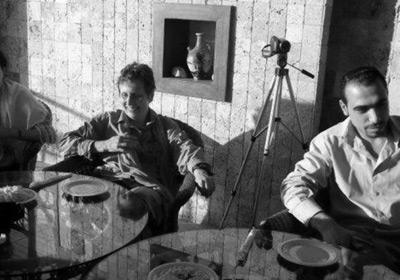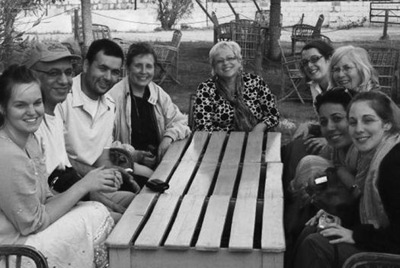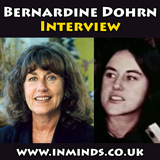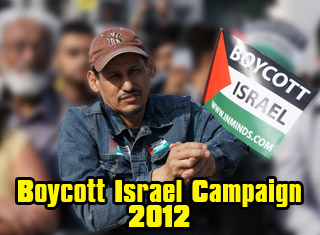
 Innovative Minds © 2014. All Rights Reserved. www.inminds.co.uk | |||||||||
The Meaning & Importance of Cultural BoycottsCathy Gulkin, Point of View magazine This past September, just a few months after the bombardment of Gaza by Israel, John Greyson, Naomi Klein and 1,500 others, including myself, signed the ‘Toronto Declaration: No Celebration of Occupation’ to protest the Spotlight on Tel Aviv at TIFF 2009. The controversy surrounding the Declaration conflated censorship, boycotts and political protest. As the Boycott, Divestment & Sanctions (BDS) movement against Israel is only five years old, this seems like a good time to make some important distinctions.  Cathy Gulkin in Gaza City I am no stranger to political boycotts. I was 10 years old in the summer of 1965 and was responsible for grocery shopping for our family. We drank freshly squeezed orange juice every day but I was strictly instructed not to purchase the South African oranges that the local supermarket sometimes carried, but Jaffa oranges from Israel instead. My parents were early adopters of the boycott against South African apartheid. On one memorable shopping excursion I found that South African oranges were the only ones in the store and decided to purchase these rather than come home empty handed. My mother insisted I bring these “trayf” items back to the supermarket and explain to the puzzled manager why they were being returned. Twenty years later the international BDS campaign against South African apartheid was no longer the purview of the left-wing fringe, but had been widely adopted and soon after, the apartheid regime fell. Fast-forward another 20 years and Israel, one of apartheid South Africa’s staunchest allies, is being targeted by a similar BDS campaign launched by Palestinian civil society. In 2004, 70 groups launched the Palestinian Campaign for the Academic and Cultural Boycott of Israel (PACBI). In 2005 they were joined by a further 171 organizations calling for an economic BDS campaign. For decades, Israel has accused the Palestinians of using terrorist tactics to advance their cause. The tactic of BDS is a peaceful means to press for justice. It was successful in bringing down the apartheid regime in South Africa without bloodshed, and it can be successful here as well. However, unlike the call to boycott Israeli fruit or manufactured goods, the call for academic and cultural boycotts is often misinterpreted, misunderstood or willfully misrepresented by those who oppose it. When we signed the Toronto Declaration at TIFF, we were immediately accused of trying to censor Israeli filmmakers. Accusations of censorship are very serious in our community—it is one issue upon which most of us agree: censorship is abhorrent and dangerous to cultural producers. But the declaration clearly stated: “We do not protest the individual Israeli filmmakers included in City to City, nor do we in any way suggest that Israeli films should be unwelcome at TIFF. However, especially in the wake of this year’s brutal assault on Gaza, we object to the use of such an important international festival in staging a propaganda campaign on behalf of what South African Archbishop Desmond Tutu, former U.S. President Jimmy Carter, and UN General Assembly President Miguel d’Escoto Brockmann have all characterized as an apartheid regime.” TIFF Co-director Cameron Bailey objected to the accusation that the festival was being used by the Brand Israel campaign to further their propaganda: “There was no pressure from any outside source,” wrote Bailey in a letter posted on the TIFF website. “This focus is a product only of TIFF’s programming decisions. We value that independence and would never compromise it.” However, he added, “We recognize that Tel Aviv is not a simple choice and that the city remains contested ground.” We were accused of anti-Semitism—this in spite of the fact that many of the signatories are Jewish, and when Jewish Voice for Peace posted the declaration on their web- site, they gathered a further 9,000 signatures. This is the new McCarthyism: trying to shut down debate by equating criticism of Israel with anti-Semitism. In response to the accusation that we were calling for the destruction of the State of Israel, Naomi Klein said, “The reason we object to the spotlight is not past events but present day ones—for instance, the fact that Tel Aviv, far from being outside the conflict, is the military centre of Israel, a place from which fighter jets departed on their missions to Gaza last December/January.”  Members of the Code Pink Delegation that travelled to Gaza in May, 2009 to deliver medical supplies and toys The Toronto Declaration stirred up a lot of passionate debate, which it was meant to do, but it wasn’t a boycott. However, this winter, a number of us who had been part of it (myself included) sent out a call from the Palestinian Campaign for the Academic and Cultural Boycott of Israel to 80 international film schools to boycott the Tel Aviv International Student Film Festival. Again we were accused of attempting to censor filmmakers and again the strategy of boycott was being confused with the act of censorship. In our letter we clearly made the distinction: “The definition and practice of censorship is clear: it is wielded by a force that is opposed to your film, and that has the power and the willingness to prevent it from being shown. This is not the situation here. You and your students are being asked to voluntarily withdraw your collaboration with a festival that colludes, however unknowingly, with injustice. In contrast, Palestinian artists daily suffer from outright censorship, travel bans, and intimidation by Israeli military authorities. The Israeli Government has been censoring and crippling Palestinian cultural production for generations. Palestinian civil society has no power or will to silence or censor. They can only appeal to people of conscience, such as yourselves, to support them in their struggle to achieve their human rights.” What good could it possibly do to discourage artists and academics from around the world from getting together, watching each other’s films or exchanging research and ideas? Aren’t film festivals and university campuses forums for cross cultural understanding and peaceful awareness? These are valid questions. Unfortunately, universities and cultural industries are not independent of the state that funds them. Universities in Israel contribute heavily to Israeli military research and development. They helped to develop the technology used to bomb Gaza, to build surveillance systems used against the Palestinians and to construct the separation wall. Israeli universities are deeply connected to the Israeli military industrial complex and, by extension, complicit in the Occupation. Film is not only an art form; it is also an industry. The Israeli film fund’s budget this year is $67 million. Film and television are also choice media for state propaganda: witness the Brand Israel Campaign. The cultural and academic components of the South African boycott were particularly effective because they isolated the middle class and elite in that country from the rest of the world. When they were unable to participate in the Olympics, or when the Sun City festival was subject to the boycott, they found that they had become “trayf.” Those who no longer wished to be shunned pressured their government to end apartheid. Israel, perhaps more than any other nation, needs the support of the international community if it is going to survive. Therefore we have the power and the responsibility to pressure the Israeli government to do the right thing. I travelled to Gaza this past May on a humanitarian mission with Code Pink and Independent Jewish Voices to deliver medical supplies and toys. Gaza is still under siege, unable to rebuild its devastated infrastructure. There were no Jaffa oranges on the streets of Gaza, not because of a Palestinian boycott, but because Israel prevents sufficient food, fuel and medical supplies through its borders. It is practising collective punishment upon the Palestinian people. It is breaking international law with impunity and it is up to the international community to use every peaceful strategy possible to pressure Israel to abide by the countless UN resolutions it has flouted over the past 62 years. Cultural boycotts combined with economic boycotts, divestment and sanctions are an effective means to that end.
This article was originally published in Point of View magazine Source: http://imeu.net/news/article0018997.shtml Related ArticlesAlso Of InterestPage URL: http://inminds.com/article.php?id=10386
|
|
Support Us
If you agree with our work then please support us.Campaigns INMINDS Facebook Live Feed Latest Video's
INMINDS Twitter Feed Tweets by @InmindsComFeatured Video's
You need Flash player 8+ and JavaScript enabled to view this video.
[all videos (over 200)..] Featured MP3 Podcast  "You cannot simplify the question of violence.. You look at human history - the American revolution, the civil war, the end of slavery in the United States, the African National Congress, the end of colonialism - by and large these were some combination of popular social uprisings and social movements and non-violent protests AND armed resistance. Now that doesn't mean I'm advocating for any armed action today, I'm not. I'm committed to finding ways of acting and speaking and making people laugh and doing art and disrupting the war machine in other ways, but I think focusing on violence when we have the comfort of being protected by mass of armed violence is not non-violence at all.. if you are pointing to the mass of violence and who's doing the mass of violence in the world today, you have to look to state violence - that's people bombing whole cities from the air.. " A founder of the Weather Underground, a revolutionary group that waged war against the US government in the 70s in response to the Vietnam War. Interview, Radio Neatherlands (TSWI) 30 June 2007 [12min / 6Mb] [all podcasts..] Newsletter Feedback |
 |
 |





















































